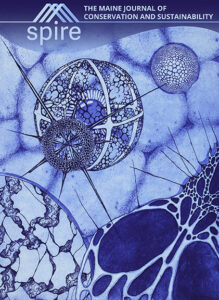‘Maine Journal of Conservation and Sustainability’ to be published on Earth Day
 “Spire: The Maine Journal of Conservation and Sustainability” will be published on Earth Day, Wednesday, April 22, says editor-in-chief Elyse DeFranco.
“Spire: The Maine Journal of Conservation and Sustainability” will be published on Earth Day, Wednesday, April 22, says editor-in-chief Elyse DeFranco.
This is the fourth annual issue of the online journal — created and compiled by a team of University of Maine graduate and undergraduate students — that highlights work from researchers, writers and artists from across Maine.
In the face of the worldwide pandemic and challenges that people are experiencing, “sustainability has come to mean something even deeper to many,” writes DeFranco, who is pursuing a degree in environmental communication.
The journal includes pieces that depict resilience, community-building and hope, says DeFranco.
“I’m humbled by the relevance of the work in the journal, which further demonstrates the importance of working toward a future together, as a society, one that acknowledges our interdependence and the interconnected nature of each and every choice that we make,” she writes in her letter from the editor.
Andrea Lani’s essay titled “Faith in a Seed” about her family’s connection to the American chestnut tree is one example of hope and resilience.
“To bring a species back from extinction — for the American chestnut is functionally extinct — is an act of faith, of peering fate directly in the eye and declaring that you will not be undone,” Lani writes.
Several other pieces selected for the journal include a research abstract about kelp aquaculture, student perspectives on sustainable food production and diet choice, poetry, and polyester plate lithography prints titled “Crosscut” that observe the history of logging.
The cover art is Sarah Lafontaine’s copperplate etching titled “Micro Nomos” of ocean microorganisms called Radiolaria.
“The work that I do more often than not depicts textures or creatures from the ocean … I’ve always tried to capture how beautiful, while also delicate, these specimens are … These are creatures who have long predated humans, and yet we could easily become their demise,” writes Lafontaine, a UMaine Bachelor of Fine Arts student, in her artist statement.
“It’s our responsibility to maintain a balance that our oceans have managed for millions of years, as well as with all other ecosystems on Earth … Efforts towards a fully sustainable future need to continue, and so does our mission of education, awareness, and knowledge.”
In DeFranco’s letter, she describes a recent evening walk on campus when she heard the calls of wood frogs making their way to pools after months of frozen isolation.
“Miraculous in the best of times, I feel an even stronger admiration and kinship with these frogs today, and will be spending many spring evenings sitting by the pools, listening to their ecstatic reunion, and waiting until the day sometime soon when our turn will come.”
Previous issues of Spire also can be found online.
